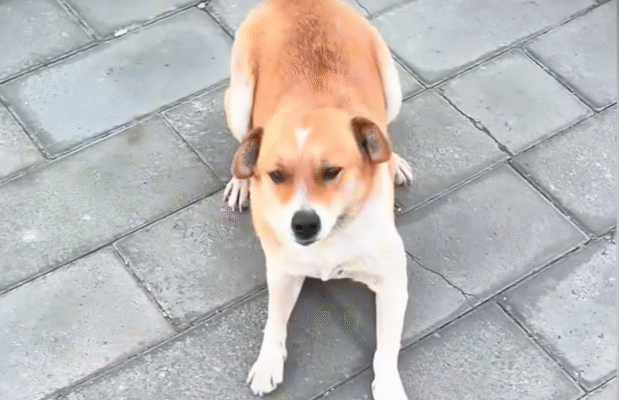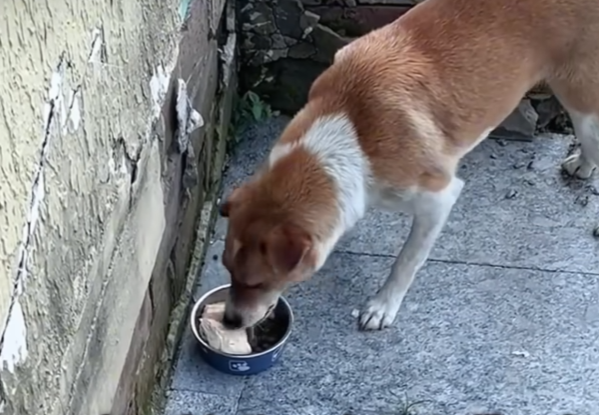
It was 3:30 in the morning when I first heard the sound—a faint scratching outside the front gate, followed by a low, desperate whimper. At first, I thought I was dreaming. The world was wrapped in silence, the kind of silence that only winter nights know—when even the air feels frozen in place.
But then I heard it again.
A cry. Weak. Trembling. Coming from the darkness beyond the porch.
I sat up in bed, heart pounding. My dog Max, who slept by my feet, lifted his head too, ears perked. He let out a soft growl—not angry, just wary. Something—or someone—was outside.
I slipped out of bed, pulled on my jacket, and quietly stepped toward the front window. Through the fogged-up glass, I saw a shadow—a small figure sitting by the gate. The porch light flickered faintly, and that’s when I realized it was a dog.
A thin, scruffy dog, sitting in the freezing cold, staring straight at our house.
She wasn’t moving, just watching—eyes fixed, body shivering, breath coming out in small clouds.
My first thought was that she might belong to someone nearby, maybe lost or waiting for her owner. But there was something strange about the way she sat there—silent, patient, like she’d chosen our house for a reason.
Max whined softly, pressing his nose against the window. I could feel his unease.
It was below freezing outside. No creature should have been out there.
I grabbed a flashlight and stepped outside. The air hit me like knives. My breath turned to mist as I slowly walked toward the gate.
“Hey there, girl…” I said softly.
The light fell on her, and my heart twisted.
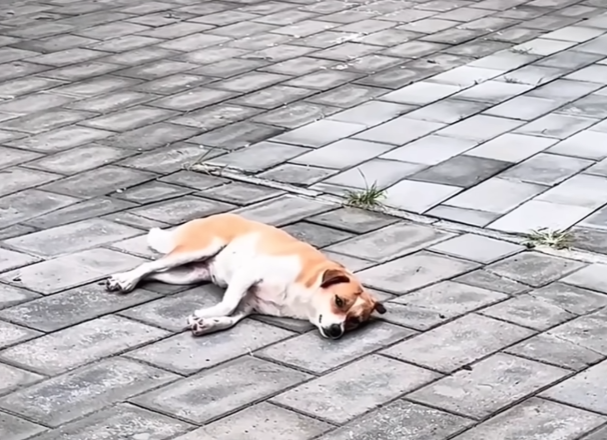
She was small—maybe a year old. Her fur was matted with ice, her paws red from the cold. She had no collar, and her ribs showed through her thin frame. But what caught me most were her eyes.
They were wide, pleading, filled with something I couldn’t describe—fear, exhaustion, and something like hope.
She didn’t bark. Didn’t move. Just sat there, trembling, staring at me.
“Where did you come from?” I whispered.
When I crouched down and reached out a hand, she flinched, crawling backward slightly, then stopping—as if torn between fear and desperation.
That was when I noticed something else. Her belly was swollen—not from food, but from pregnancy. She was about to give birth.
“Oh no…” I breathed. “You poor thing.”
Without thinking, I opened the gate and whispered, “Come here, sweetheart. It’s okay.”
She hesitated for a long moment, then slowly limped forward. The moment she stepped into the light, I saw the full picture—scars on her back, frost clinging to her fur, eyes heavy with exhaustion. She had been wandering for days, maybe weeks, searching for somewhere safe.
And somehow, she had chosen my house.
I carried her inside, wrapped her in an old blanket, and set her beside the heater. Max watched from across the room, curious but gentle. I gave her water, which she gulped down desperately, and some warm food. She ate like she hadn’t tasted food in days.
Afterward, she curled up tightly, head resting on her paws, eyes finally closing.
I sat there for hours, watching her breathe, listening to the soft hum of the heater and the faint wind outside.
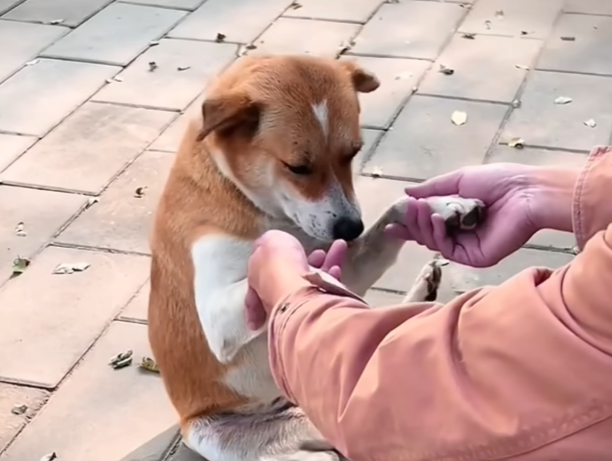
Why had she come here, of all places?
The next morning, I took her to the vet. They confirmed what I already suspected—she was heavily pregnant and due any day now. She was also malnourished, anemic, and severely dehydrated.
“She wouldn’t have survived much longer out there,” the vet said quietly. “You brought her in just in time.”
I named her Luna, after the cold, lonely moon that had watched over her that night.
That evening, as the temperature dropped again, Luna grew restless. She paced the corner of the room, whining softly. I stayed beside her, whispering gently, stroking her head. Hours passed, and just before dawn, she began to give birth.
One by one, tiny lives entered the world. Five puppies. Each one breathing, crying, alive.
Luna licked them tenderly, curling around them with quiet strength. I had tears in my eyes as I watched her—this fragile, half-frozen creature who had almost died alone in the dark was now a mother, bringing new life into the world.
Max sat nearby, calm and respectful, as if he knew this was sacred.
That night, our home was filled with warmth—real warmth, the kind that comes from love and life.
Days passed, and Luna began to heal. Her fur grew soft again, her eyes brightened, and her tail wagged whenever she saw me. The puppies thrived, growing stronger each day, nursing safely beside their mother.
But there was one night I’ll never forget.
About two weeks after Luna’s rescue, I stepped outside again around 3:30 AM. It was cold, but not as freezing as before. The moon hung low, and the world was silent. Luna followed me to the door, sat beside me, and stared out into the dark yard.
I looked down at her and said, “You were out there once. Watching. Waiting.”
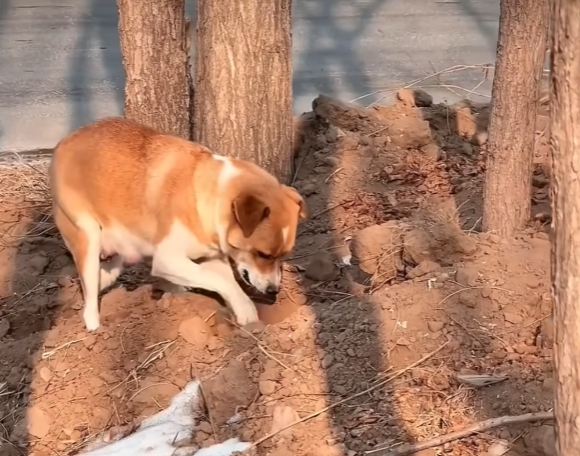
She turned her head, looking up at me with those same soulful eyes, and pressed her nose against my hand.
It hit me then—she hadn’t just wandered by accident. She had been watching, maybe sensing warmth or light through the windows. She had been searching for safety, for a sign that someone cared.
And she had chosen right.
Weeks turned into months. All five of Luna’s puppies found loving homes, one by one. Each family that adopted them promised to love them forever. Luna stayed with me—she had already found her home.
She and Max became inseparable. They played together, slept side by side, and barked at passing cats in perfect harmony. But every once in a while, on quiet winter nights, Luna would sit by the window, looking out into the darkness, just as she had that first night.
And I would sit beside her, hand resting on her back, whispering, “You’ll never have to face the dark alone again.”
That’s when I realized something profound:
Sometimes, it’s not us who rescue them—it’s them who find us.
Luna came in the middle of the night, when the world was asleep, when everything was still and frozen. She didn’t cry for pity or attention. She simply waited—believing, somehow, that help would come.
And it did.
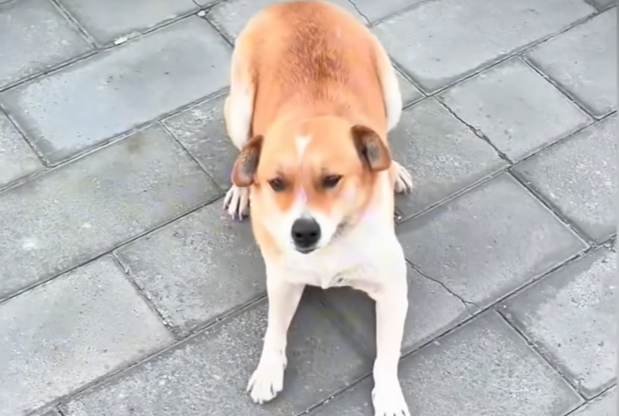
If I had ignored that sound, that faint whimper in the dark, she would have died that night. Her puppies too. Five innocent lives would have never existed.
So now, whenever I hear a sound outside at night, I always check. Because sometimes, it’s not just a stray or a noise—it’s a soul asking for help, quietly, desperately, hoping someone will listen.
And that’s why I tell everyone I know: never ignore a dog in the dark.
You never know—she might be watching your house, praying you’ll open your door.
Because when you do, you’re not just saving her life—you’re changing your own.
Every morning now, when I wake, Luna greets me with bright eyes and a wagging tail. She’s no longer cold, no longer broken. She’s family.
And sometimes, when I think about that freezing night, I whisper to her softly, “Thank you for watching our house, Luna. Thank you for finding us.”
She leans against me, sighs deeply, and closes her eyes.
A reminder that miracles don’t always come in the light.
Sometimes—they arrive in the cold, quiet hours before dawn, wrapped in fur, waiting patiently by your door. 🐾
